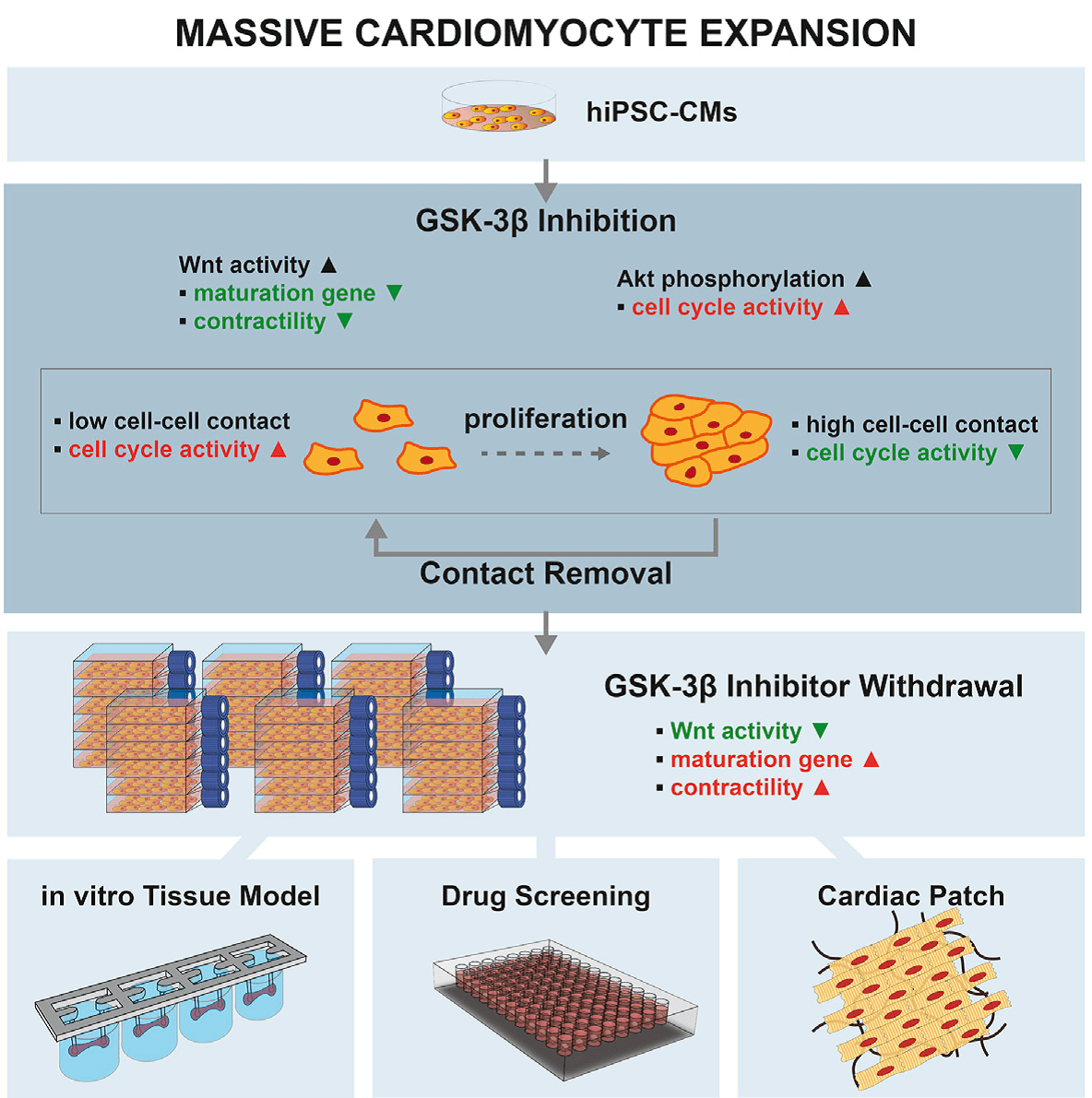Heart failure is a major health problem with a significantly unmet medical need. Causes of heart failure include heart attack from coronary artery occlusion (blocked blood flow in an artery) or cardiomyopathy, an intrinsic disease of heart muscle cells, among others. The loss of heart muscle cells (cardiomyocytes; CMs) leads to impaired heart function, resulting in frequent hospitalization and/or death.
Prior studies have shown that the adult human heart has little to no ability to regrow damaged muscle cells. Currently, patients with severe or end-stage heart failure require heart transplantation or implantation of a mechanical ventricular assist device (mechanical pump), which is expensive and has been associated with significant infection and risk of blood clots. Recent attempts to regenerate the loss CMs have focused on cell-based approaches, such as an injection of stem cell-derived CMs or transplantation of engineered stem cell-derived heart tissue. While these approaches show great promise, the biggest hurdle to implementing stem cell-derived CM therapy currently is the lack of a sufficient number of CMs (e.g., multiple billions needed per patient) due to the extremely labor- and time-intensive process of generating pure stem cell-derived human CMs.
In work published this week in Cell Stem Cell, an international team of the Stanford Cardiovascular Institute and Regenerative Medicine Center Utrecht researchers, led by co-first authors Jan Buikema, MD, PhD (Stanford/UMC Utrecht), and Soah Lee, PhD, and senior author Sean Wu, MD, PhD, Sanford and Joan Weill Scholar and Associate Professor of Medicine, uncovered a way to significantly improve the expansion of human induced pluripotent stem cell (hiPSC)-derived CMs.
Beyond serving as an autologous cell source (i.e., cells coming from the same patient) of CMs for transplantation, hiPSC-CMs can also be used for drug screening to identify new therapeutic drugs to treat heart failure. Prior to this work, it has been common to grow hiPSC-CMs in densely packed culture where CMs are often in direct contact with one-another. Studies by Wu and colleagues, reported on July 2nd, 2020, show that this direct contact is a major barrier to hiPSC-CMs expansion (contact-mediated inhibition). Avoiding cell contact by keeping fewer cells in culture (<100,000 cells/10 cm2), plus treatment with Wnt agonists, allows iPSC-CM to grow and divide continuously for 2 months, generating multiple billions of hiPSC-CMs with each production. Wnts are critically important for development, influencing cell growth and division and differentiation. The Wnt agonists serve as a Wnt surrogate, allowing multiple billions of hiPSC-CMs to be generated.
Importantly, the authors showed that the expanded iPSC-CMs have the same functional characteristics as the un-expanded iPSC-CMs, making them an excellent source of cells for drug screening, cell-based therapy, and mass production of engineered heart tissue as was demonstrated by Regenerative Medicine Center Utrecht researcher Renee Maas led by Joost Sluijter, PhD, professor UMC Utrecht. These findings have major implications for the future of cardiac therapies and regenerative strategies in patients with myocardial damage, congenital heart defects, or cardiomyopathy. The findings presented in this publication provide a major step forward in reaching the goal of cardiac regenerative medicine – to restore the function of damaged heart muscle.
Other Stanford Cardiovascular Institute affiliated authors are William Goodyer, Orlando Chirikian, Guang Li, Sharon Paige, Daniel Lee, Haodi Wu, David Paik, Lei Tian, Francisco Galdos, Nazan Puluca, Benjamin Beyersdorf, James Hu, Aimee Beck, Sneha Venkamatran, Kristy Red-Horse, Vahid Serpooshan, and Joseph Wu. Other Stanford authors are Yi Miao, Siyeon Rhee, Srilatha Swami, Joy Wu, and Christopher Garcia. The team also included researchers from the University Medical Center Utrecht in the Netherlands, Amsterdam University Medical Centers, University of Bonn in Germany, Emory University and Georgia Institute of Technology, and Michigan State University College of Human Medicine.
